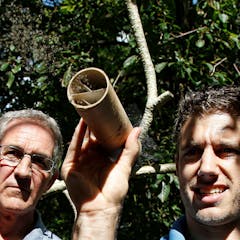
Articles sur Mosquitoes
Affichage de 61 à 80 de 197 articles

This project may help to eradicate malaria by developing new technologies to prevent mosquitoes from biting people when they are outdoors.

This autumn, embrace puddles. Even tiny pools of water can be essential for birds, trees and pets — from washing away chemicals on leaves to forcing worms to emerge.

This invasive mosquito thrives in the type of habitat commonly found in urban areas. This means that malaria could become more prevalent in African cities.

Mosquitoes love the wetter weather La Niña brings to some parts of Australia. But will we see more mosquito-borne disease?

A warming climate may change the types of viruses that thrive. A new report suggests that the threat of malaria may be replaced by dengue, for which there is no treatment and no cure.

Gene drive guarantees that a trait will be passed to the next generation. But should society use this tool to control insect populations?

Yellow fever, malaria and Ebola all spilled over from animals to humans at the edges of tropical forests. The new coronavirus is the latest zoonosis.

Mosquitoes that had Microsporidia MB - a tiny parasitic fungus - never became infected with malaria.

Release of GM mosquitoes in Florida is imminent. But a multidisciplinary team of scientists believe that more studies are needed first. They encourage a publicly accessible registry for GM organisms.

Mosquitoes are responsible for a number of potentially deadly illnesses, but they’re highly unlikely to be playing a role in the COVID-19 pandemic.

Feel like mosquitoes are picking you out of a crowd when looking for someone to bite? It may come down to the smell of your skin and how heavily you breathe.

Temperatures are soaring and bushfires are decimating Australia’s wildlife. So how can we avoid creating a breeding ground for mosquitoes when putting water out for thirsty birds and animals?

Nuisance-biting and mosquito-borne disease are ongoing concerns for health authorities. But an effective citizen science program is now showing how all of us can help beat the bite of mozzies.

Mosquitoes have intricate and essential relationships with plants. Understanding their important work as pollinators would help to understand their role in different ecosystems.

Genetically modified mosquitoes were released in Brazil in an attempt to halt the spread of dengue fever by reducing the mosquito population.

Mosquitoes love sugar – so much so that can delay their search for our blood. Now, their sweet tooth may have revealed an important genetic weapon against the spread of mosquito-borne disease.

In the ongoing arms race to kill off mosquitoes that spread malaria, researchers have modified a naturally occurring fungus that kills mosquitoes with a deadly toxin to wipe out these insects faster.

Progress against malaria has stalled. There’s been an increase in the number of cases reported since 2015.

Mosquito-borne dengue virus returned to central Queensland after being absent for decades. But while most Australian cases involve travellers, this one is locally acquired.

Alarm bells went off when several recent studies reported mass insect die-offs in different parts of the world. But reports of an ‘insect apocalypse’ have been greatly exaggerated.
